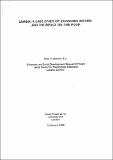January 1996 Zambia: A Case Study of Economic Reform and the Impact on the Poor.

View/
Date
1996-01-30Author
Jesuit Centre for Theological Reflection
Type
Case StudyLanguage
enItem Usage Stats
70
views
views
11
downloads
downloads
Abstract
Zambia is a "classic case" of a poor African country struggling with the problems of political and economic transitions. In 1991 , it moved out of 27 years of one-patty/one-man rule by the leader of its independence fight, Kenneth Kaunda, and embraced multi-party democracy with the election of Frederick Chiluba as President. While today the structures of democracy may be more or less in place (e.g., many different parties, periodic elections, relatively free media), the attitudes of democracy still are weak (e.g., tolerance, commitment to the common good, transparency and accountability). The movement away from a socialist economy to a liberalized capitalist economy has accompanied the political transition and caused considerable hardship among the people. The government's full-scale implementation of a Structural Adjustment Programme (SAP) has particularly hurt the poor.
Description
Zambia became independent in 1964, with the break-up of the Rhodesian Federation of British colonies, Nyassaland (now Malawi), Southern Rhodesia (now Zimbabwe) and Northern Rhodesia (now Zambia). Because of its copper wealth, Zambia was one of the richest of the newly-independent African states. But today it is one of the poorest. Its economic difficulties, accompanied by decline in social services and deterioration of infrastructure, were caused by (1) a development model inherited from the colonial period (e.g., over-reliance on copper as an export-earner, under-appreciation of agriculture), (2) a series of policy decisions (e.g., adoption of an inefficient controlled economy model, dosing of the border to Rhodesia), and (3) negative external structural forces (e.g. i declining price of copper, rising price of petrol and other imported goods, increasing foreign debt burden).